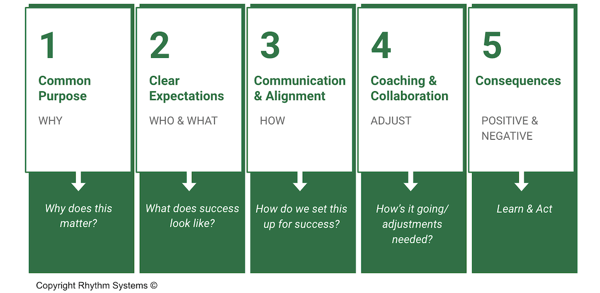The trouble with accountability is that, well, you have to live it. Patrick Lencioni writes; “Once we  achieve clarity and buy-in, it is then that we have to hold each other accountable for what we sign up to do, for high standards of performance and behavior. And as simple as that sounds, most executives hate to do it... .” For many CEO’s, Managers, and Team Leaders, the thought of doing the consistent work around holding others to a clear expectation, measuring results, as well as being transparent about their own personal performance can seem both daunting and uncomfortable.
achieve clarity and buy-in, it is then that we have to hold each other accountable for what we sign up to do, for high standards of performance and behavior. And as simple as that sounds, most executives hate to do it... .” For many CEO’s, Managers, and Team Leaders, the thought of doing the consistent work around holding others to a clear expectation, measuring results, as well as being transparent about their own personal performance can seem both daunting and uncomfortable.
Thought leader Anne Loehr identifies the following statistics in her studies on the crisis of accountability in today’s workforce:
- 93% of employees don’t really understand what their organization is trying to accomplish in order to align with their own work.
- 85% of leaders aren’t defining what their people should be working on — and an equal number of employees crave clarity.
- 84% of the workforce describes itself as “trying but failing” or “avoiding” accountability, even when employees know what to fix.
- 80% of people see accountability as punishing.
While these stats may seem a bit overwhelming, the good news is that leaders are not alone in facing the challenge of creating a culture of accountability in their organizations. Rhythm Systems has developed the 5 C’s of Leadership Accountability to help you reverse the exact trends listed above and align both teams and individuals throughout companies.
The following real world accountability examples from a variety of markets reveal the potential impact of committing to accountability and realizing its benefits for both the team and the organization.
Market: Software/Technology
- Challenge: Departments were working incredibly hard to achieve their own goals in the areas of sales revenue and scientific data development - but when sharing results, it became clear that efforts and resources were not working together which created conflict, prevented achievement, and revealed a misalignment of resources.
- Change: Working with department heads, the CEO built out a clearly defined criteria for success around both Sales team and Science team goals - each department understood what they needed to do as well as how to do it and who it impacted/benefited in the other departments.
- Outcome: Weekly reporting and communication moved the departments from competing for resources to collaborating and supporting each other to meet the larger quarterly/annual goals for the company
- 5 C’s Connection: Clear Expectations / Communication & Alignment: The CEO worked hard to get crystal clear on expectations and worked together with leadership to focus and align everyone involved.
Market: Retail/Automotive
- Challenge: Rapid expansion through acquisition created cultural challenges by bringing in a high volume of new team members who needed to be connected to the Core Purpose and Core Values of the company
- Change: Executive leadership created a framework to analyze the companies being purchased early on in the acquisition process and created a training program to repetitively discuss the importance of common purpose and why it matters to both customers and employees (simple tactic - the VP of Operations would go from person to person in a new store and hand out $20 bills to anyone who could share the Core Values of the company with him)
- Outcome: Consistent improvement in Net Promotor Scores for new acquisitions while maintaining strong NPS at existing locations
- 5 C’s Connection: Common Purpose: Executive Leadership consistently connected the Why of the company to each individual team member, allowing them to be accountable to something larger than themselves.
Market: Healthcare/Services
- Challenge: Creating new executive level team member role and adding that person to the existing leadership team in order to grow and improve the commercial health insurance contracting side of the business. The existing team was reticent to accept the person/position as part of the group and consistently challenged the new person and their results.
- Change: Improved and better defined the expectations of the new role as well as performance metrics at both the big picture (annual) and weekly (granular) level, created reporting dashboard to track both success and failure, encouraged more transparency on challenges, and adjusted resources to overcome obstacles
- Outcome: This enabled each executive team member to understand what work was being done, share feedback on possible improvements to make, offer support and assistance, as well as celebrate progress being made
- 5 C’s Connection: Collaboration / Consequences: The CEO and departmental VP’s utilized collaboration to move from being critics to coaches. Making both results and consequences visible moved the challenge from being about fixing the person to solving the problem.
The 5C’s of Team Accountability is a field tested framework that will enable you and your company to move from struggle to success in to creating an accountable culture and building the foundation for your future.
Now that doesn't sound like trouble at all.
Want more information on Team Accountability? Check out these additional resources:
Why You Need a Peak Performance Plan for Your A-Players
Leadership Accountability Definition in Management
Team Accountability Begins with Personal Accountability
Building Team Accountability: Job Scorecards
10 Signs of an Accountable Culture [Infographic]
Growing Team Accountability in Your Organization
5 Steps to Having an Accountability Discussion [Video]
Learn more about accountable leaders and teams.
Photo Credit: iStock by Getty Images
This blog was last updated on March 20, 2020.




